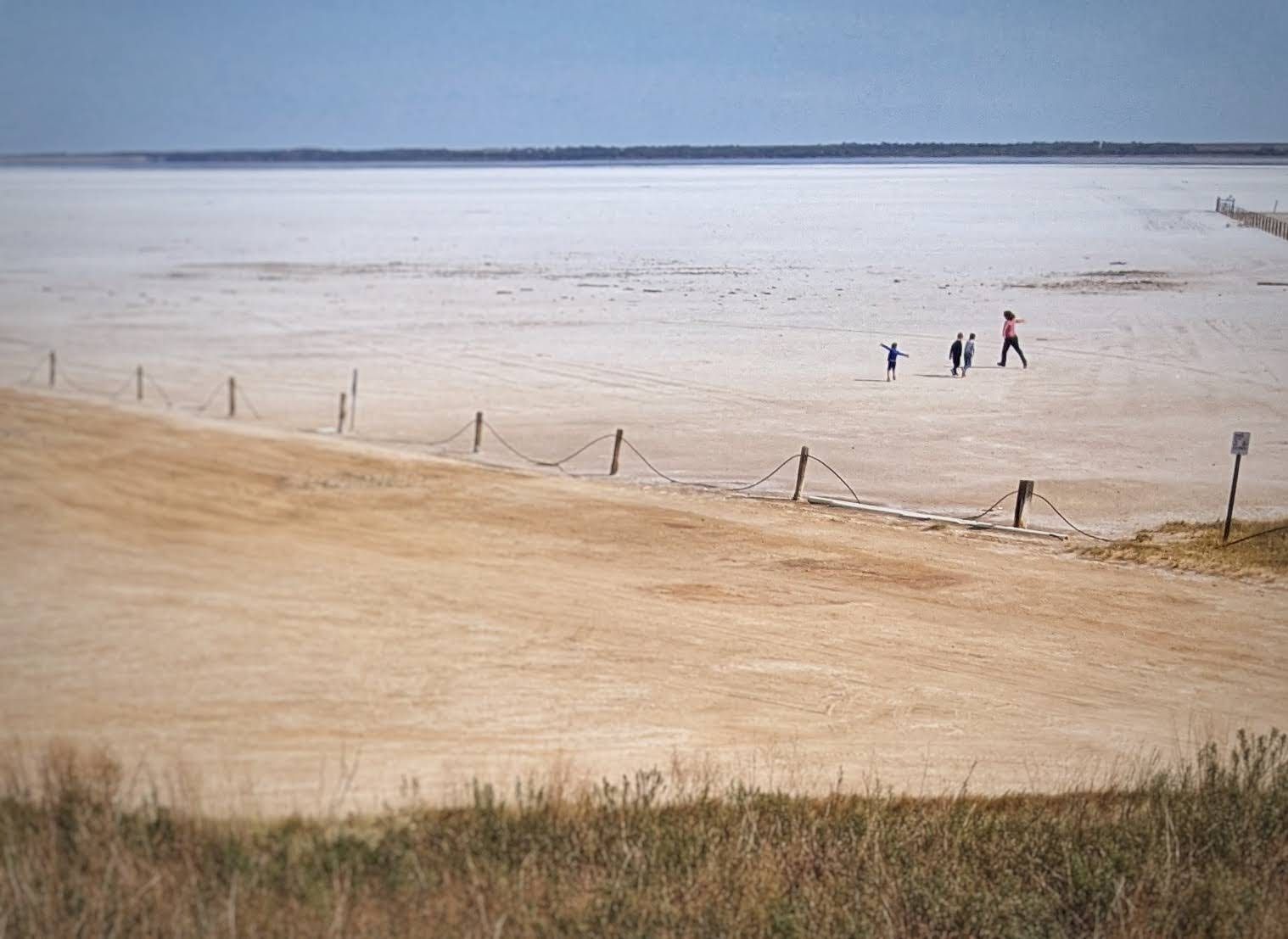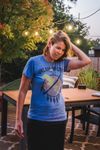6. the salt plains
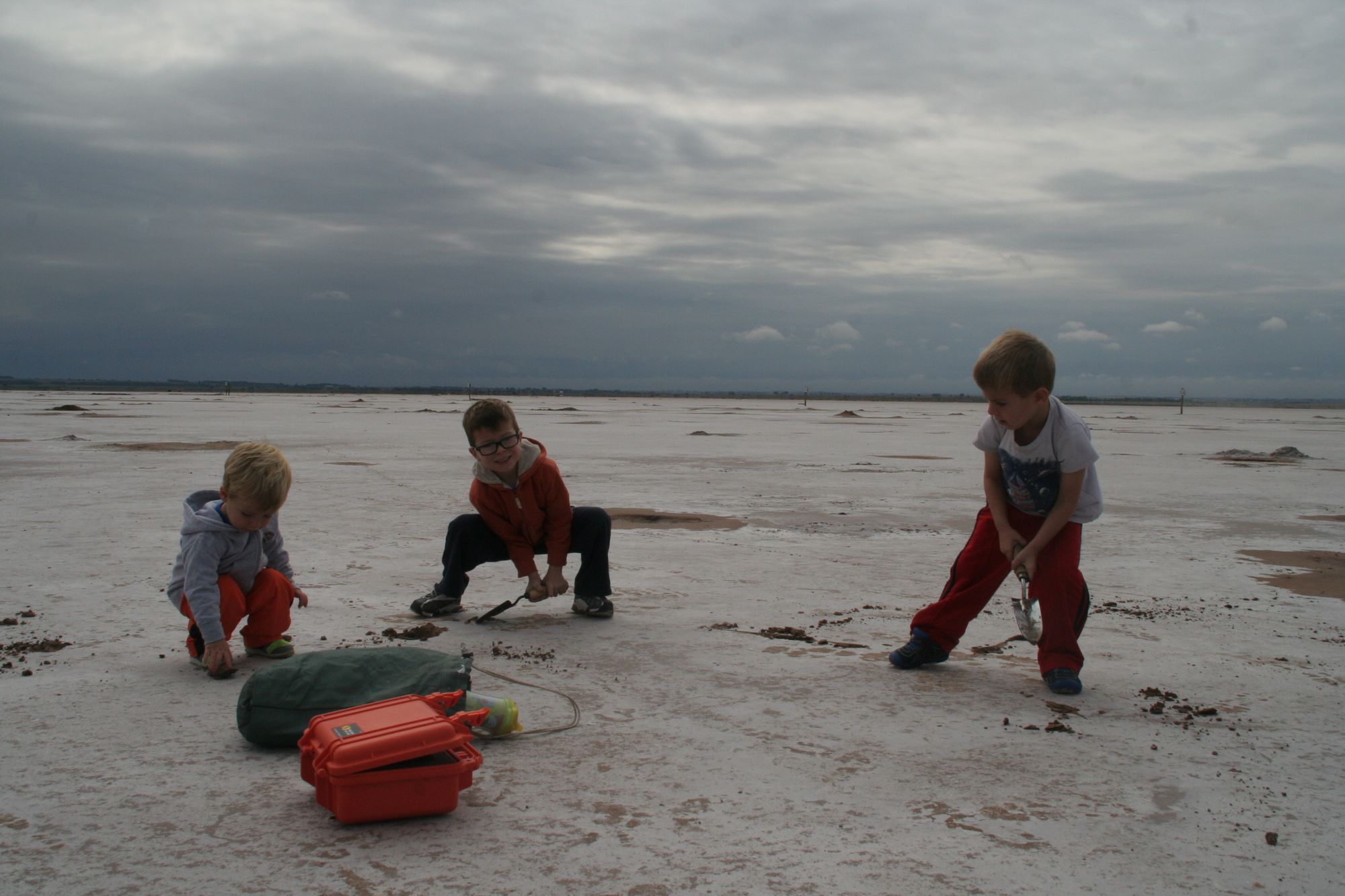
The leaves outside my bedroom window were turning red and gold. My annual October feelings of wretchedness and grief had begun to stir already; it was the end of October when I lost my son five years before. I had a tough personal challenge to face: it was time to open the lid of a black, cardboard box filled with selenite crystals. What appeared to be just an innocent jumble of amber-colored, angular rocks was, to me, a nauseating wave of crushing memories. The crystals were mementos gone all wrong, the antithesis of concert-ticket stubs and fortune-cookie messages that I keep after happy occasions. Still, I opened that box for the first time in years. As I did, my breath caught audibly in my throat as I thought about why I was doing something so hard for me. For a moment I closed my eyes in a dramatic self-protective gesture, as the scene of my family gathering those crystals hung before me, practically visible as I allowed my memories to come.
Five years nearly to the day before, my family had been on a camping trip to the Great Salt Plains, a giant slab of land in northwest Oklahoma covered in salt from an ancient inland sea that has long-since evaporated. Standing on the edge and looking out toward it, one could easily believe she is facing a flat, white tundra that stretches for miles. Six months out of the year, visitors can walk out onto the crusty, treeless salt plains and carefully dig for selenite crystals, which can be found just a few inches underground. It is the only place in the world to find hourglass selenites, and permission is granted to keep what you dig.
Our family of five-- my husband BJ, my three small boys, and I, pregnant with a fourth boy, arrived at the eerie-looking plains in jubilant fashion, sporting shovels and ready to get dirty. In my fuzzy memories, there was laughter, salty peanut-butter sandwiches, cool September weather, and a fabulous adventure. The five of us dug small holes all over the place looking for crystal treasure as the heavy, grey skies threatened to open and pour at any moment. The place was deserted. Before we were truly ready to leave, the rain began to fall. Scrambling to the van and laughing as we got drenched, we piled inside and carefully arranged our dozens of delicate, salty crystals amidst tufts of paper towels in a makeshift box. Afterwards, I would see the storm as a metaphor for all the misery that came next-- a crystalline moment in life terminated prematurely by a thunderclap.
The boys slept on the way home as BJ and I quietly dreamed of the future. We named our baby on the drive home.
“I like the name Clarence,” I admitted with a shrug.
“Clarence?” BJ asked skeptically. “Where did you come up with that?”
“You know, like the guardian angel from It’s a Wonderful Life. It’s just a sweet name. Clarence,” I repeated.
“I don’t think so. What about Alton?” he suggested.
Back and forth we traded, each insisting on certain middle names and arguing our ideas until we settled in the middle, satisfied, on Jude O’Neil. During the last half of the conversation, I tried to ignore the rising nausea within me, attributing it to pregnancy hormones and motion-sickness. By the time we pulled into our driveway, I was so sick I ran straight to the bathroom.
The vomiting and intense stomach cramps did not remit for nearly two weeks. Two weeks of a stomach virus that prevented me from nourishing my unborn baby, two weeks of losing everything I put in, losing ten pounds on a frame that was already thin. Two weeks of urgent care and emergency room visits, blood draws, IV fluids, medications to ease my pain. In the end, I lost my son anyway. My beautiful baby had lost his chance at life.
In the autumn months that followed the salt plains and the miscarriage, BJ painstakingly cleaned many of the crystals we discovered, and he stored them in a small, black box that was easily accessible to the boys, so they could peruse their treasures when they wished. He managed his own grief on a back burner, experiencing it in bouts much later even, as he put his focus on seeing me through the initial aftermath. As time went by and my grief bent me in half, I began to feel physical disgust for that box of crystals. BJ had done a marvelous job of removing the physical reminders that I could not bear to see at the time-- the medical bills, flowers we had been given, the positive pregnancy test that I couldn’t make myself throw away-- but somehow those crystals were just the worst. The camping trip, I felt, had been the beginning of the end. I was furious, and I was broken. Looking for something to blame, I settled on the salt plain and its crystals.
Eventually BJ hid the black box of crystals on the highest, left-most shelf of our eleven-foot, built-in bookcase. Stuffed alongside gardening books and a few well-worn sketchpads, it was meant to never be seen unless one went purposely looking. I never looked. The box gathered a film of dust for five years until the autumn of 2020, when I finally went purposely looking. I had a challenge to face.
As I slowly ran my palms across the smooth wood of the blue ladder leading up the bookcase, I silently cursed my stubborn nature. In recent months, I had become unsettled by my resentment toward these inanimate keepsakes. My children had asked time and again to return to the salt plains, and I had refused. When I thought about the situation rationally, I could see the salt plains had nothing to do with my son’s death-- yet I had given them the power to affect me anyway. The negativity surrounding them had claimed free rent in my soul, but it was never the salt plains’ fault. My hatred for the crystals had been my own doing.
The psychologist in me knew this overarching truth: facing head-on the anxieties that rob us of our serenity can often yield huge feelings of accomplishment and peace. It was time. I needed to face this box of crystals and reclaim the pieces of myself that had, in essence, crystallized from blame and hatred. Heaving a sigh, I appealed to the universe for good vibes and climbed the ladder up to the godforsaken box.
This, I thought, is going to suck.
As I pulled the small box from its shelf and opened its lid at my desk, my breath audibly caught in my throat, and I felt a thud in my chest. Congregated to the left side of the box in one big sleep-pile, the crystals almost looked afraid of me, as though they had gathered under the mantra of safety in numbers. I found this scenario to be unexpectedly amusing, and I nearly smiled; if only they knew I was far more afraid of them than they were of me.
Nauseated, I pulled them out one by one and studied them closely until my hands found a crystal that felt comfortable: heart-shaped and with a glassy smoothness. My fingers were irresistibly drawn to it. It boasted a translucency that many of the others lacked, revealing a pocket of earth under its surface. Under the light, I hovered over my chosen crystal with the magnifying glass from a “Junior Scientist” kit as my son George walked in.
“I can’t believe I actually found one I like!” I exclaimed to him.
“Cool,” he said in his stylish eight-year-old manner, peering over my shoulder. “It looks like a weird-shaped heart. Or a shark tooth!”
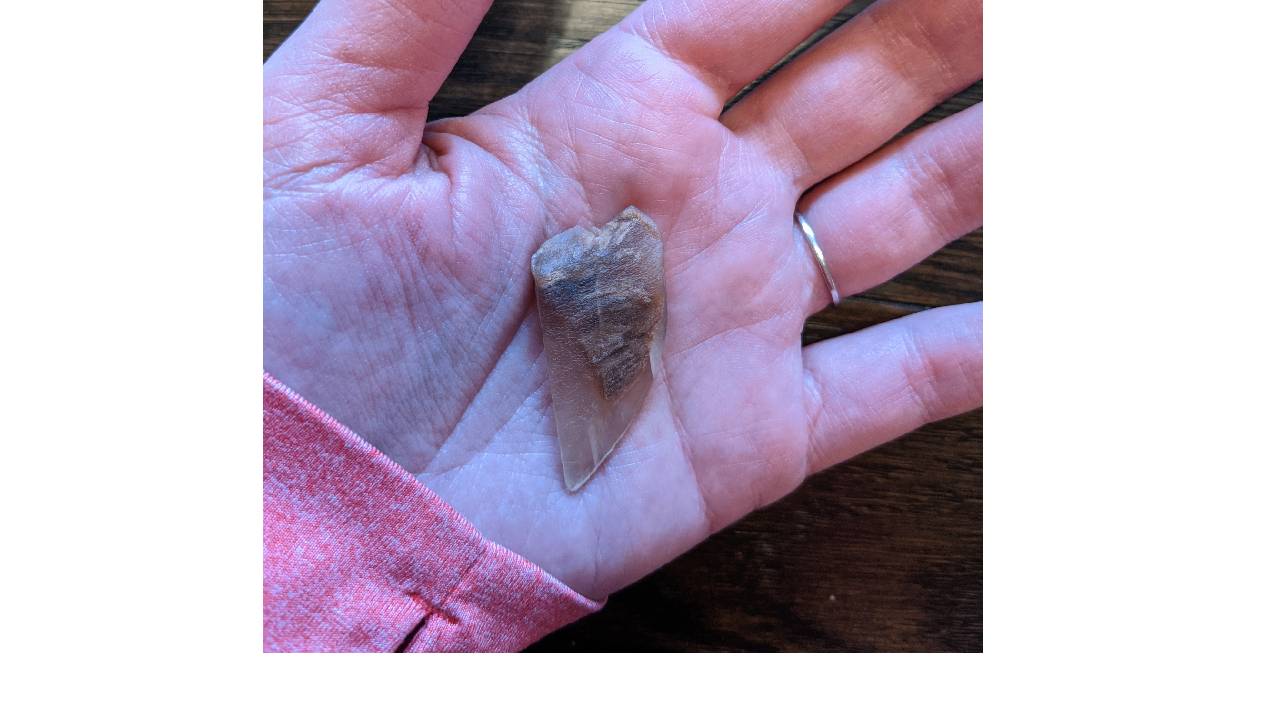
I scarcely believed the next words that tumbled from my mouth, though they had been bubbling under the surface, unwilling to be admitted aloud until now.
“I wonder if we should go back to the salt plains. What would you think about that?” George’s eyes widened with the possibility.
“Sure!” he exclaimed. “You mean like, next week when we have fall break?”
Whoa, I thought. Now it’s out and real. Next week?
“I guess we could do it next week,” I replied slowly, gears in my head turning as George whooped and ran to tell his brothers. A sense of adventure was slowly gaining speed on the nausea I felt; within just another moment, it was outweighing it.
So it came to be that we found ourselves loaded in the van the following Thursday morning, headed to the abominated salt plains. Sandwiches were packed, road-trip entertainment for the boys was prepared, towels and shovels packed neatly in the back with an ice chest, a playlist of inspiring songs queued and ready.
I was loaded with support and well-wishes, and a vehicle full of my boys and husband. I wasn’t alone. Though I was apprehensive about how painful it might be when we arrived at the plains, I knew facing them again was something I needed to do. The drive there was calm and sunny.
The wrench came flying into our glorious plan three hours later as we rolled to a stop in front of a closed gate at the entrance to the park. The gaping, ivory plains lay in full view just beyond the forbidding, white sign that read in all-capital blue letters, “AREA BEYOND THIS SIGN CLOSED.” Adjacent to it was a sign eight times larger shouting, “Report Trespass into Closed Areas to Sheriff!” with a phone number listed.
BJ moaned loudly. “You have GOT to be kidding me!”
“Um, no,” I emphatically stated. “It doesn’t actually mean it’s closed.” BJ quietly disagreed, knowing the reality was not what I wanted to hear from him.
“What’s going on?” the boys began chiming and clamoring from the rear of the vehicle.
“Just… give me a minute! I can’t!” I said in exasperation as I flung open the door.
I stepped out and breathed in the fresh air so I could mutter expletives as I walked up the ramp of a nearby platform overlooking the plains. A frustrated family at the top had an apologetic park ranger on speakerphone. A quick eavesdrop told me all I needed to know: the plains had closed for the season yesterday in order to assist bird migratory patterns, and would not reopen for six months. In all my preparations I had overlooked the simple act of checking to make sure the place was actually open. We had missed the digging season by a mere day. As I grappled with the reality of this massive foul up, tears began forming. I thought about the news I was going to have to deliver my children-- tidings they had probably already received in the van from their father.
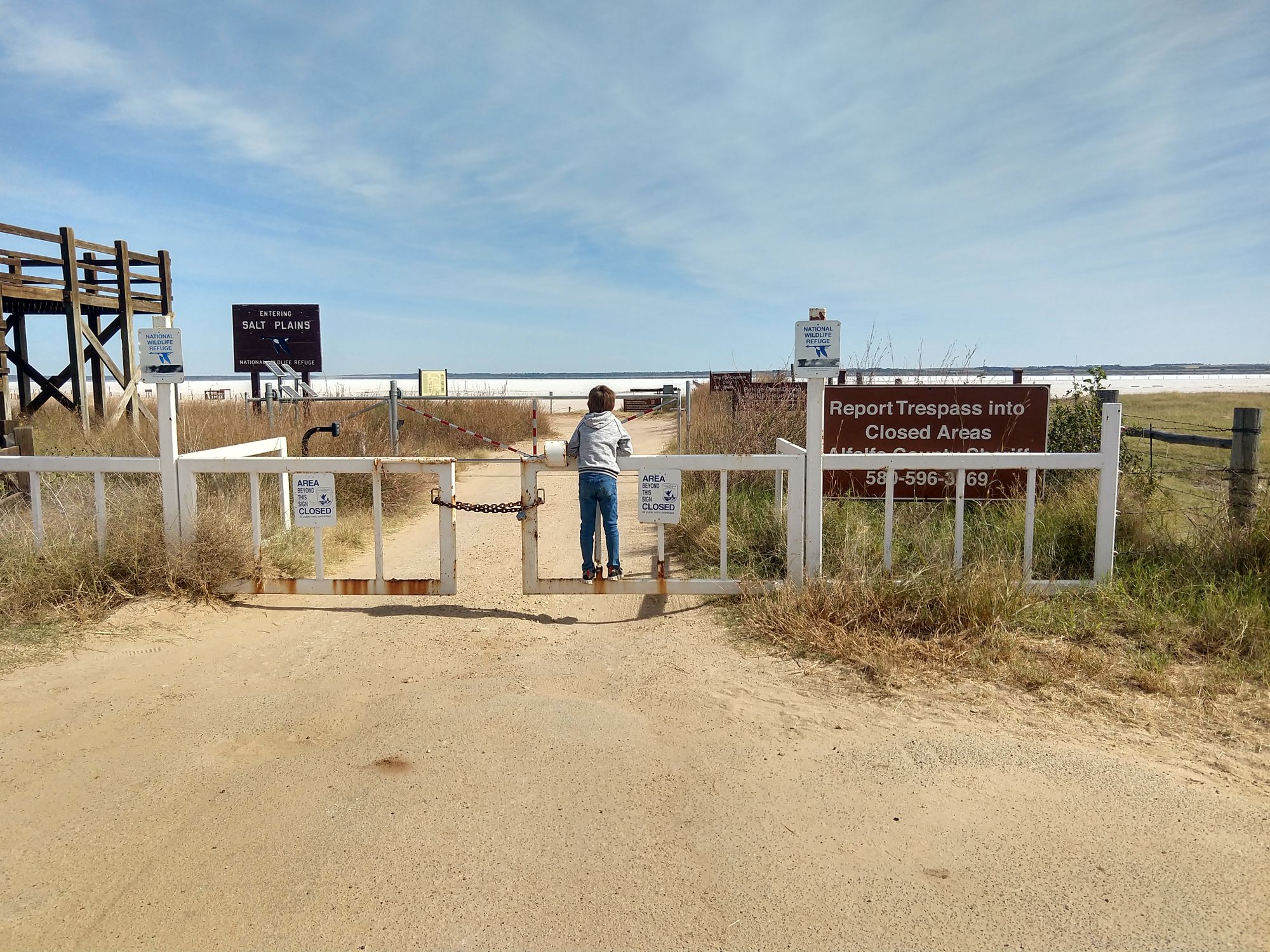
Credit to those boys for their sweet acceptance of such a disappointing outcome. They stood on the lowest rung of the metal gate, arms draped over the edge and looking out to the plains as BJ and I set up a blanket and our meal in the long grass to the side of the road. Our family made conversation about what a weird year it was as we ate our sandwiches and watched numerous cars approach the gate, read the sign, and drive away.
The irony of our situation was not lost on me. After years of avoiding any mention of this place at all costs, there was suddenly nowhere else I’d rather be but beyond those gates. This paradox sat in my craw for the next half hour as we ate, explored the legal side of the gate, and packed up for the long trip home.
I don’t even know what made me do it. I’m usually a rule-follower. I may look slightly alternative with a facial piercing and visible tattoos, but I was the girl who cried in first grade when my name got written on the chalkboard for whispering to Meredith Prykryl during quiet time. So I surprised even myself when I announced to my family,
“When that car drives away, I’m going out there. Anyone else want to come?”
"Yeah! Can I go?” six-year-old Van asked eagerly, joined quickly by George. Their newfound respect for me shone in their nearly-identical brown eyes.
“Seriously?” BJ asked, turning to face me. “What are you going to do out there? Not dig!”
“I’m going to run and dance and laugh. I’m making peace with this place today,” I told him resolutely. Getting caught trespassing didn’t seem like my favorite way to round out the day, but neither did not running out to the plains to shake out my demons.
My oldest son Silas is the least likely of my children to buck the system; not surprisingly, he stayed behind with BJ. My younger three sons (we welcomed one more after our miscarriage) were positively delighted to skirt the rules and join me. When the last remaining car pulled out of sight, we squeezed through the horizontal pipes of the gate with broad grins, feeling like thieves in the night.
“Hurry!” I prodded, unabashedly encouraging minors in the gross neglect of state mandates. “We may not have much time before the next car comes!”
We wasted not a moment, skipping the hundred yards through the tall grasses along the gravel walkway to make our way to the plains. And when our tennis shoes at last touched the salty crust, we hit the ground running. The feelings of lightness and freedom were instantaneous for us all. I ran with my face to the blue, cloudless sky-- no chance of rain this time. Laughing and whooping, we circled like airplanes, zigzagging through each other with arms held aloft, soaking up all the warmth that the sun and white earth had to offer. We danced and skipped, closing the cover on a book that desperately needed finishing. And when we were done, we lay down on our backs, spread-eagled, relishing our feelings of smallness on this vast plain under an endless blue sky.
"I release you," I whispered to the bizarre landscape surrounding me, pressing my cheek against the salt. My children danced around me as I gazed back up to the blue beyond. The sun shone warm on my face, a light-hearted reminder to me that things can go wrong, and then go wrong again, and keep going wrong until suddenly they become right.
